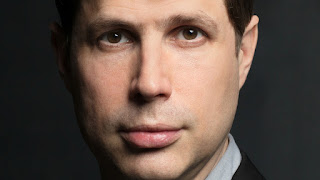 |
| Daniel Kehlmann |
The model of the big chains has failed — inflexible, rarely appealing, always the wrong books in stock, often employees who don't know much.
Does this sound like the Barnes and Noble nearest to you? I think the statement overstates the case, but still it holds a lot of truth. With some exceptions, their employees do tend to be short-timers with little knowledge about the books they sell. Despite the size of the stores, they seem to focus on those books that sell best, stocking lots of copies of these, while ignoring less popular books even by the same authors, let alone less well known authors. Often I can browse for a long time without finding anything I am looking for. There's often nothing I either haven't already read or already seen on their shelves and rejected. The "new book" tables can be interesting, yet it is shocking how many old books are placed on these tables by staff members who apparently don't know any better.
But the small, nice, cosy bookshops with limited space and enthusiastic booksellers can't be the answer.
Why not? Because of that limited space. They, too, must pay attention to those books that sell a lot of copies, leaving even less space for more obscure books a few readers, myself included, are looking for. A shopper can always order books at these stores, but the same can be done at Barnes and Noble (or from Amazon). And smaller stores are less likely to offer discounts.
I have been impressed with Tombolo Books, a new store that opened a few months ago in St. Petersburg, Fla. I have purchased several books there that I have not seen at bigger stores. Still I am always disappointed by Tombolo's limited shelf space. After 10 minutes of browsing, or less, I am usually done. That's not much reward after a 30-minute drive.
The answer is therefore: big bookshops that are, however, not part of a chain.
A bookstore like this is risky business. A larger storefront means a higher rent, and perhaps more employees. That means selling a lot of books to succeed. Yet a few stores like this have shown the model can work. I have written before about how impressed I was with Parnassus Books in Nashville and McLean and Eakin Bookstore in Petosky, Mich. The latter is in a relatively small city with seasonal tourist trade and lots of winter snow. Yet this downtown store, with three levels and a large selection of books, has survived for a number of years. Parnassus has a strip mall location on the edge of a large city. Younger than McLean and Eakin, it also appears to be thriving.
Both stores emphasize books, not coffee, gifts, greeting cards and the like. McLean and Eakin carries an excellent selection of upscale board games, but these are in the basement, not the main floor, which is filled with books. When I last visited, I left with a shopping bag full of books (and one game) that I had never seen elsewhere.
Other successful large, non-chain bookstores have succeeded by selling used books as well as new ones. I am thinking particularly of Powell's in Portland, Ore., and Haslam's in St. Petersburg. Both have been around for a long time.
Such stores combine many of the advantages of the large book chains with the advantages of the small independent bookstores. Risky or not, there are enough success stories to suggest they may be, as Kehlmann says, the best answer.
No comments:
Post a Comment